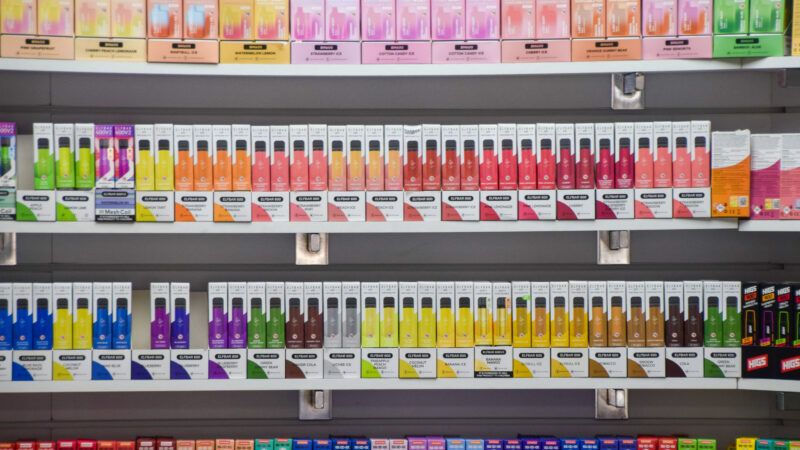Food and Drug Administration Defends Refusal To Approve Flavored E-Cigarettes Before the Supreme Court
The FDA’s regulations are burdensome and unnecessary to address the inflated high school vaping epidemic.

The Supreme Court heard the Food and Drug Administration's (FDA) appeal in Food and Drug Administration v. Wages and White Lion Investments, LLC on Monday. The case concerns the FDA's requirement for scientific studies to approve premarket tobacco applications (PMTAs) for flavored electronic cigarette (e-cigarette) manufacturers and distributors. The FDA's requirement contradicts data and years of its own guidance for the end of reducing an exaggerated epidemic of underage nicotine use.
Concerns about rampant teen nicotine use are common. They are also commonly exaggerated. NPR originally claimed that "the percentage of high school kids who reported daily vaping of e-cigarettes jumped from 9.7% in 2014 to 30% in 2023." (The outlet has since printed a correction.) What the FDA and CDC's 2023 National Youth Tobacco Survey actually said was that 29.9 percent of high schoolers currently using e-cigarette were daily users; only 10 percent of all high schoolers were current users, (down from 14.1 percent in 2022), 90.3 percent of whom used flavored products. If "e-cigarettes have filled the vacuum" left by smoking, as former FDA deputy commissioner William Schultz says to NPR, the vacuum is not as large as people are led to believe.
The 2024 National Youth Tobacco Survey shows that this figure has fallen even further: from 10 percent to 7.8 percent. E-cigarettes have become increasingly unpopular with middle school and high school students despite sales increasing 47 percent from 2019 to 2023. More than 80 percent of this is attributable to flavored products, according to data from the CDC Foundation and Truth, a nonprofit public health organization committed to preventing youth nicotine addiction.
E-cigarettes are not the only product inappropriate for consumption by middle schoolers and high schoolers, alcohol is too. Despite the popularity of Pink Whitney, Fireball, Mike's Hard Lemonade, and other sugary, colorful alcoholic drinks among high schoolers, federal regulators allow these products to be manufactured and distributed. The prohibition of such goods to adults would be unwarranted, not to mention infeasible. Nonetheless, the paternalistic Family Smoking Prevention and Tobacco Control Act of 2009, which grants the FDA the authority to regulate tobacco and nicotine products, restricts what kinds of tobacco products adults may consume.
The Act explicitly "prohibits a cigarette or any of its components from containing…any artificial or natural flavor (other than tobacco or menthol) or any herb or spice (including strawberry, grape, orange, clove, cinnamon, and vanilla." The law also directs the Secretary of Health and Human Services of the FDA to establish the Center for Tobacco Products and to, among various responsibilities, "develop an action plan to enforce restrictions on the promotion and advertising of menthol and other cigarettes to youth."
But the Act also "prohibits the secretary from: imposing unduly burdensome requirements" on manufacturers and importers. This provision is problematic for the FDA's wholesale denial of PMTAs to flavored nicotine products. In the Fifth Circuit's January 2024 opinion, Judge Andrew Oldham explains that the FDA "sent manufacturers of flavored e-cigarette products on a wild goose chase" by imposing new testing requirements after "promulgat[ing] hundreds of pages of guidance documents" between 2018 and 2020.
Oldham cites the FDA's own guidance documents to underscore the agency's arbitrariness. Its October 2018 Guidance stated that "youth behavioral data [are] not required" and its June 2019 Guidance said that the agency "does not expect that applicants will need to conduct long-term studies" to receive PMTA approval. Yet, in August 2021, the FDA announced its blanket denial of 55,000 e-cigarette applications, citing a lack of randomized control trials or long-term studies. Over the following two weeks, a further 946,000 applications were denied and the agency did not approve a single flavored e-cigarette product since, says Oldham.
In its 2020 Enforcement Guidance, the FDA complained that e-cigarettes' concealability, convenience, and ease of use make them particularly popular with young people. These features, like fruity flavors, are also valued by adult consumers. The FDA should celebrate the decline in cigarette and e-cigarette use among young people and let adults enjoy these embarrassingly flavored stimulants.


Show Comments (43)